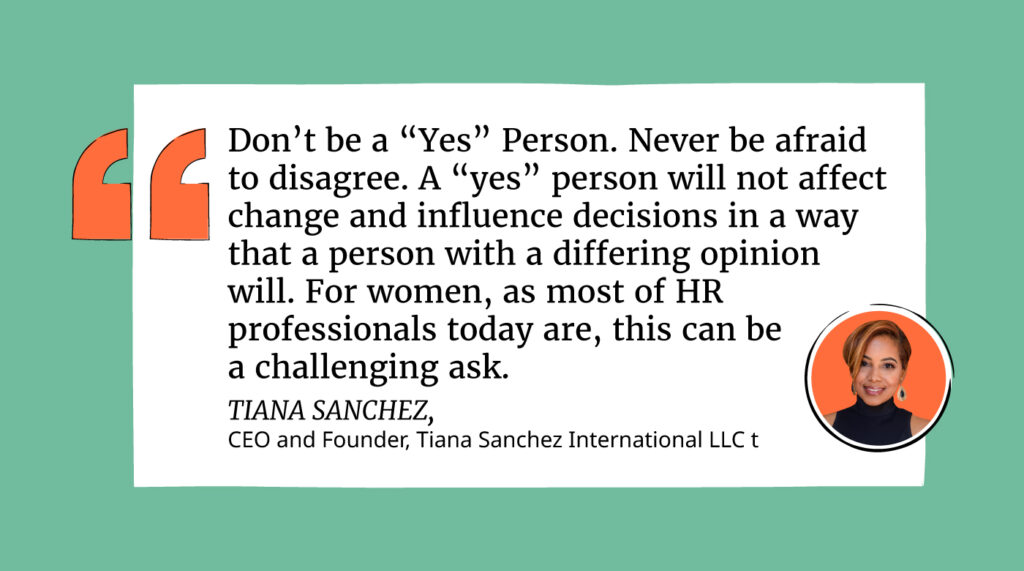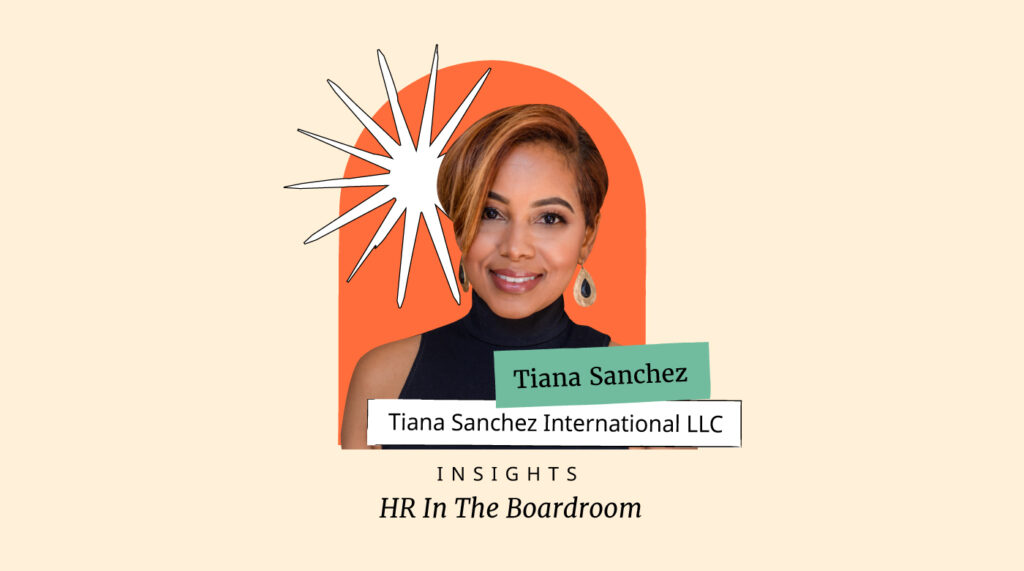Most leaders don’t see how to employ HR as a strategic pillar of the business and this leaves a lot of professionals feeling somewhat frustrated.
In this interview series, we talk to HR professionals, business leaders, and anyone who is an authority on HR who can share what companies can gain by having HR in the boardroom and why and how HR should help drive company decisions.
Hi Tiana, welcome to the series! Before we drive in, our readers would love to get to know you a bit better. Can you tell us a bit about your backstory and how you got started?
It was a purely a divine intervention that took me from unemployment to CEO of TSI (Tiana Sanchez International LLC) talent development and learning company.
Twenty years of career success led me to believe I was untouchable and secure in my role as a banking manager, but in 2011 that all changed with a lay-off notice. The financial crisis of 2008 had finally hit home.
Without a job, a degree, or income, I bet on “ME” and started my own business in May 2011. In the past 12 years, we have grown the business, increased our company’s impact through our podcast, Like a REAL Boss, created an online hub for on-demand leadership training modules, delivered over 100 keynotes and presentations across the U.S., and published three books (“Undefeatable: Conquering Self Defeat”, “F’UP – The Upside of Failure” and “Leaders in Pearls: How to Be a Change Architect”, an anthology with 24 other women).
It’s been said that our mistakes can be our greatest teachers. What's a funny mistake you made when you were starting out and what did you learn from it?
I’m not sure this would qualify as funny, but I’m happy to share. Early in my business, I was invited to speak at colleges to college students about my career journey and “How to Market Yourself”.
At the beginning of one of these talks, I was taken aback by the sheer silence in the room. I would speak, and there was no audience response. *Crickets*. I continued my talk and finished about an hour later.
After the talk, a table was set up for me as a “meet and greet” with students. I was sure everyone was heading for the door. To my surprise, there was a line of students with big smiles telling me how much they enjoyed the talk!
I learned to never underestimate the impact and value of what I do. And, second, just because people are not speaking, it does not mean they are not listening!
None of us are able to achieve success without some help along the way. Is there a particular person who you are grateful for who helped get you to where you are? Can you share a story?
This is a tough one as there are many, many people that helped. The person who had the greatest influence on my success was my grandmother, who has been deceased for over 20 years.
She was the first black, female businesswoman and entrepreneur I was introduced to. She worked hard and was, on many days, dog-tired. Her self-determination and no-nonsense attitude was, and is, an inspiration. It’s the days when doubt sinks in that I lean on her example for encouragement and support.
Can you please give us your favorite “Life Lesson Quote”? Can you share how that was relevant to you in your life?
My favorite “life lesson quote” and one that is attached at the end of every episode of our Like a REAL Boss Podcast is “Everyone wants to succeed, but not everyone is willing to do the work.”
Akin to that is “If you want what others have, then you have to be willing to do what others have done to get what others have gotten.” I like both quotes for these reasons:
- If you want to excel in life, you must work for it. It will not be given, handed out, passed down, or copy and pasted for you.
- It’s absolutely okay if you do or do not want what others have, but if you’re complaining about what they have and what you don’t have, that’s a problem.
I love my time, flexible schedule, and the freedom to do as I please without the “overwork” syndrome taking over me. I’m perfectly fine running my own race, at my own pace, on my own schedule.
Human Resources (HR) practitioners and leaders are strategic partners and “relationship brokers” that deserve a seat in the boardroom at new, growing, and mature organizations.
Thinking back on your own career, what would you tell your younger self?
Get a mentor sooner. Take business, economics, and leadership classes. Take Spanish classes, seriously!
The battle to “get their first” and “stand out” is ever-present among today’s working professionals and entrepreneurs. The more you gain access to resources, people, and money, the better your chances to get their first and stand out.
Let’s now move to the central part of our interview about HR. Why do you think HR deserves a place in the boardroom and in high-level decision-making?
Human Resources (HR) practitioners and leaders are strategic partners and “relationship brokers” that deserve a seat in the boardroom at new, growing, and mature organizations.
Companies gain insight from HR into people management, human interactions, operations, risk mitigation, professional development, the future of work and employees. HR partnerships are an imperative, an asset, and not a liability. They help minimize liabilities!
From your experience, how can HR people and culture professionals ensure they’re involved in strategic planning processes?
To ensure a seat at the table, it starts before hiring, the offer letter, and onboarding into their role in a company. HR professionals should clarify their role and expectations in the larger picture of the vision and mission.
Advocate for “people-centered” initiatives and be well-versed and in the know on business outcomes. Subscribe to reputable online magazines (Inc., Fast Company, HBR, SHRM) and follow reputable research firms (McKinsey, Wiley, Gallup).
Finally, you have to demonstrate, in words, action, and results the ROI and bottom line impact of your suggestions.
A lot of folks believe that CHROs would make great CEOs, but often they’re overlooked. Why do you think that is?
First, people don’t value the “business of people” the same way they value the “business of business.” Second, most professionals in the HR field are women. So let’s address the elephant in the room, shall we? Roughly 70% of women are in HR. Less than 10% of women at Fortune 500 companies occupy CEO positions. What’s wrong with this picture?
In my opinion, this lack of representation and/or inability to “ladder climb” from HR to CEO is more than a lack of business and finance acumen. The proof is in the data. Let’s do better, and promote more women from Chief Human Resources Officer (CHRO) to CEO!

What skills can HR folks work on to become more effective business partners?
Negotiation, communication, and financial acumen are all important skills for HR professionals.
Here is the primary question of our discussion. Based on your experience and success, what are the five most important ways that HR can help drive company decisions?
1 . Leverage data. Gather and share metrics in small and big decisions such as administering a poll after a meeting to determine the viability, comprehension, and clarity of the meeting. This data can help improve how meetings are run across the organization and increase the validity of your ideas.
2 . Build an outside support system. Look for support outside of the boardroom. Your help may not be in the room. In fact, many of my TSI clients are HR leaders who sought me out to help navigate a difficult transition happening in their organization. Being smart, savvy, and decisive is knowing when it’s time to ask for help.
3 . Be present. Be in the room when key decisions are made to ensure that a balance of the “human side of business” and the “business side of business” are in sync.
4 . Increase performance reviews. Make performance reviews quarterly and micro-reviews monthly. Having a more current snapshot of performance in real-time, or "IRL" as my teenager might say, will help make informed decisions regarding unfavorable role changes such as a demotion, termination and/or upward movement like a promotion.
5 . Don’t be a “Yes” person. Never be afraid to disagree. A “yes” person will not affect change and influence decisions in a way that a person with a differing opinion will. For women, as most of HR professionals today are, this can be a challenging ask. When raising concerns, provide the “why” backed by data, the “how” and the expected “results.” Know your stuff, offer alternative solutions and don’t be afraid to challenge the status quo!
Can you share 3 or 4 of the most common mistakes you have seen businesses make when faced with hard decisions?
Unpopular or tough decisions are part of the job. What makes hard decisions tough(er) are these three common mistakes:
- Not balancing the logical aspect of the decision with the human element
- Confusing or misleading messaging leading up to the decision
- Not having advocates—influential workers (preferably a non-manager, yet highly respected and tenured) in the company—to champion the decision and get behind it.
Usually, on the other side of a hard decision is a BIG change! People don’t typically do well with change.
To avoid these types of mistakes, be transparent with pertinent information. Address questions and concerns head-on. Choose the right platform to address those concerns.
Sometimes an email will suffice. Other times you might need to hold an All Hands Meeting, a forum, a town hall or focus groups for more intimate dialogue.
Is there a person in the world whom you would love to have a private lunch with, and why? He or she might just see this.
Karen Bryant, the newly appointed Chief Administrative Officer and General Manager of LA Sparks in Los Angeles.
I’m an LA girl who played basketball in high school at a time when the WNBA didn't exist. A year ago, one of my three goals was to work with this incredible franchise. Let’s see what happens!
Thank you so much for your insights, Tiana! How can our readers further follow your work?
There are three ways to stay connected:
- Connect with me on LinkedIn at Tiana Sanchez
- Visit our website to learn more about what we do
- Subscribe to our Real Boss Lady Tips newsletter
More insights from the series:

